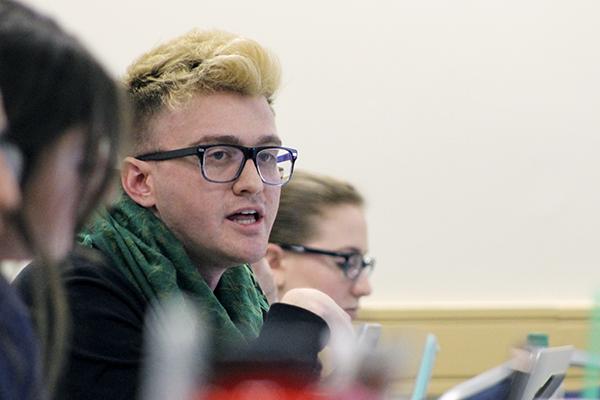The Student Association approved a package of four bills Monday that called on the University to expand resources for transgender students on campus, ranging from building up faculty training to publishing a list of gender-neutral bathrooms.
The measures also call for all offices to have a gender-neutral option on their forms, including housing and admissions, and creating sensitivity training on LGBT issues for student leaders. Some student leaders say these moves would help transgender students feel more comfortable on campus.
But at the start of the meeting, Center for Student Engagement Director Tim Miller said senators needed to meet with more administrators before moving the bills forward. He pointed out that last fall, officials changed University surveys to only ask demographic information if necessary and also offered diversity training to student leaders.
“I share these with you guys so you educate yourselves about who you talk to before you move forward a bill,” Miller said. “You all should ask questions before you write a bill. I don’t want you to waste your time on stuff we’re already doing.”
Miller also said that last week, administrators approved adding 82 new gender-neutral signs to bathrooms across campus. Those signs come after the University committed in 2012 to adding gender-neutral bathrooms to all new buildings.
Still, Sen. Brady Forrest, CCAS-G, who co-sponsored the bills, said student senators should agree on their goals before meeting with officials about how to implement them. He said he spent about a month meeting with Miller and other administrators in preparation for introducing the bill and said he thinks he and co-sponsor Sen. Victoria Goncalves, CCAS-U, did their “due diligence.”
“We really want to make sure we’re putting forward what the students want and starting from there, not starting from meetings with administrators to try and compromise and see what everyone else wants,” Forrest said.
Forrest said the bills are necessary to protect transgender students during their time at GW. As he was making the bills, he said he spoke with transgender students who had uncomfortable experiences with their professors. Forrest added that the package will help GW catch up to other schools that are doing more to support transgender students on their campuses.
“If we want to be a nationally known school, we have to lead on these issues,” Forrest said. “We’re not leading the path by any means, and we think we should be.”
Several of GW’s peer schools – including American, New York and Emory universities – all publish lists of their gender-neutral bathrooms. Emory University also uses a list of almost 200 LGBT faculty and staff members to give students an outlet or place to seek advice.
Senators also raised concerns that religious students may not feel comfortable participating in a mandated training on LGBT issues and it shouldn’t be required.
“There are some student orgs on campus that are private organizations that should be exempt if they don’t feel comfortable,” said Sen. Chris Stillwell, ESIA-U. “We need to respect people’s own personal preferences.”
But Goncalves argued that the trainings are not intended to offend the personal values of student group leaders.
“These trainings only give information. They don’t make you take a stance,” Goncalves said. “Student leaders should have this information in order to make their student org inclusive.”
Trainings, which would be led by staff at the Multicultural Student Services and LGBT Resource centers, would teach professors about gender identities and using proper gender pronouns. Student organization presidents and treasurers would also be required to undergo similar trainings.
“Once you have this information, it makes it easier to understand other people and the way other people’s gender identity, gender expression or sexuality may be different from yours,” Goncalves said.
Michael Shutt, the assistant dean for campus life and director of the Office for LGBT Life at Emory University, said Emory officials do not require trainings for students – an effort to prevent organizations from falsely claiming that they are safe places for members of the LGBT community.
“If I require you to go through that and you are not supportive of a community, the last thing I want you to do is put up a symbol that says you are accessible to the community,” Shutt said.
Mike Tapscott, the director of the Multicultural Student Services Center, and Tim Kane, the associate director of inclusion initiatives, declined through a spokesman to say how much it would cost to add the trainings or when they could start them. They also declined to say how likely it is that GW would add a third option to student forms.
“We value student input in discussing ways in which we can continue to ensure our campuses reflect and embrace a rich diversity of students, faculty and staff who are treated equitably,” University spokesman Kurtis Hiatt said.
Rob Todaro, the president of Allied in Pride, said he “wholeheartedly supports” the idea of trainings for student leaders, but that it may be difficult to add the sessions to existing orientation events.
“Student leadership training is already a tight-packed schedule of a day,” said Todaro, who is a former Hatchet writer.
But Todaro said the SA’s measures will help raise awareness about transgender students at GW and is a step in the right direction.
Earlier this year, Allied in Pride created a “Queer Guide” with information about different groups within the LGBT community. The group is also co-sponsoring a speaking event next month featuring transgender actress Laverne Cox.
“If your university is exclusive for some members, it’s exclusive for too many members,” Todaro said. “Going out of our way to make sure every student feels safe and comfortable at our University should be our utmost priority.”








